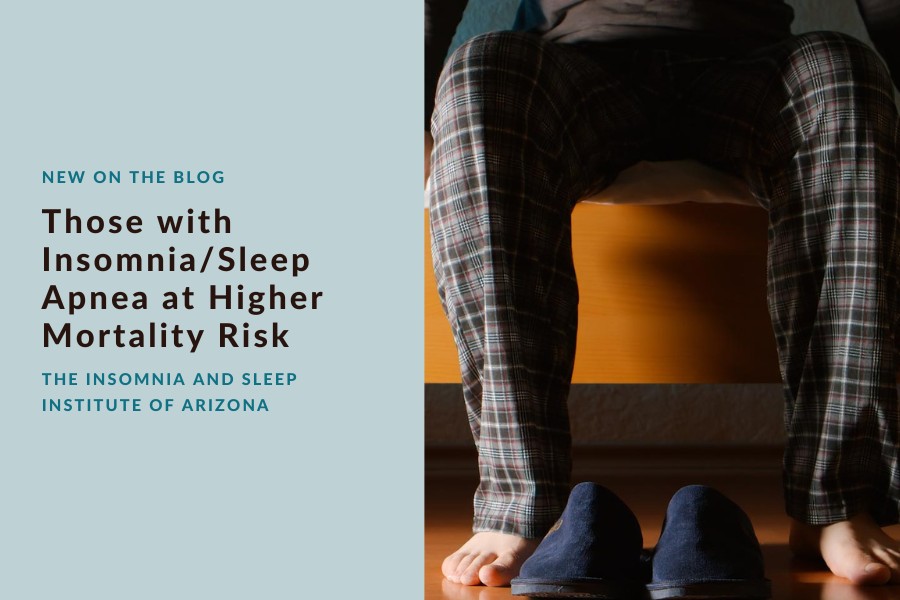Insomnia and sleep apnea are two of the most common sleep disorders, and are often co-morbidities. The Insomnia and Sleep Institute of Arizona treats both, and we work with patients as young as two years old. Both of these disorders are well-known for coming with a myriad of risks, and a recent study in Sleep Epidemiology stresses the association between them and a higher rate of mortality. In fact, the symptoms of sleep apnea and insomnia were linked to a 56 percent increase in risk for “all-cause mortality.” The good news is that both disorders can be treated and managed, but the sooner you act the sooner you can potentially extend your life.
According to the researchers, both insomnia and obstructive sleep apnea (OSA), the most common kind of sleep apnea, occur in 10 – 30 percent of the general population. Oftentimes, they occur simultaneously. The research team undertook a population-based study to determine the association between what is termed “comorbid insomnia and sleep apnea,” or COMISA, and all-cause mortality amongst nearly 7,000 participants. The mean age was 45 years and just over half were male. The national survey that the data was gleaned from occurred between 2005 – 2008.
Better Sleep, Better Life
The participants were followed for an average of 8.6 years. During this time, Cox regression models were used to determine the link between all-cause mortality and COMISA. There were controls for behavioral factors, chronic conditions beyond insomnia and sleep apnea, and sociodemographic details. The team found that there was “just” no insomnia in three percent, no sleep apnea in 20.1 percent, and no COMISA in 3.3 percent. At the follow-up period, 6.7 percent of those surveyed had died.
According to researchers, when comparing these figures to those who do not have insomnia and sleep apnea, there was a higher mortality rate for those with COMISA as well as insomnia alone. The connection between mortality and COMISA continued even after controlling chronic conditions and improving insomnia symptoms with the use of medications. However, that relationship did not continue between insomnia alone and a higher mortality risk.
Sleep Disorders and You
The authors concluded, “While our study further highlights the risk of comorbid insomnia and sleep apnea, it directly addressed the study’s aim, finding that self-reported insomnia symptoms combined with the [survey] can be used to identify people with probable COMISA at risk of adverse health outcomes.” Identifying those with the conditions is an important step and one that can be difficult in many cases—oftentimes, sleep experts require a referral from a GP. That is not the case at The Insomnia and Sleep Institute.
The first step is a correct diagnosis. That will inform testing and treatment. When it comes to OSA, the gold standard in care is CPAP therapy. However, adherence can be an issue for many if the right machinery and accessories are not selected and properly fitted. In the vast majority of cases, CPAP works well for managing OSA and dramatically improving sleep quality. Addressing co-morbidities, such as obesity when applicable, is also helpful.
The first step in managing insomnia is typically cognitive behavioral therapy for insomnia (CBT-I), which is why our team includes a clinical psychologist who focuses on this treatment. Improving sleep hygiene is often a part of this approach. This can be a life-long, safe, effective means of insomnia management that allows patients to avoid or decrease use of pharmaceuticals for chronic insomnia (acute insomnia, such as jet lag, can be helped with drugs in many cases).
Getting the Sleep You Need
There are many reasons to be proactive when it comes to improving your sleep, and decreasing mortality risk is a major one. However, lack of quality sleep also negatively affects every part of your life, from personal relationships to safety and job security. If you are concerned about your sleep or suspect you have a sleep disorder, connect with a sleep expert today. Your consultation at The Insomnia and Sleep Institute is with a sleep professional who can diagnose disorders. Schedule your consult today by calling the office or, for the fastest response, complete the online contact form now.





